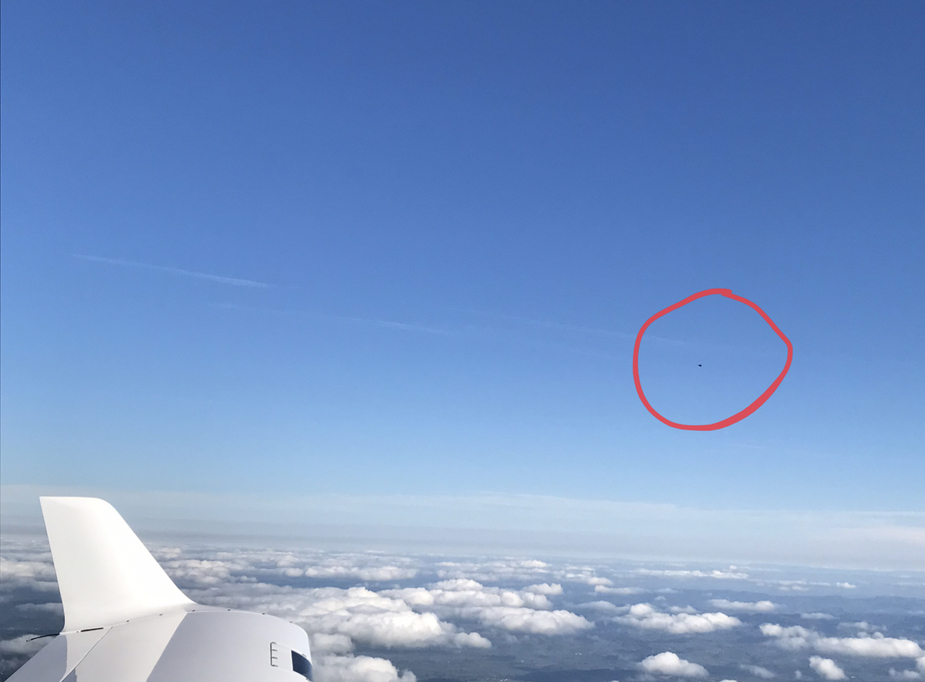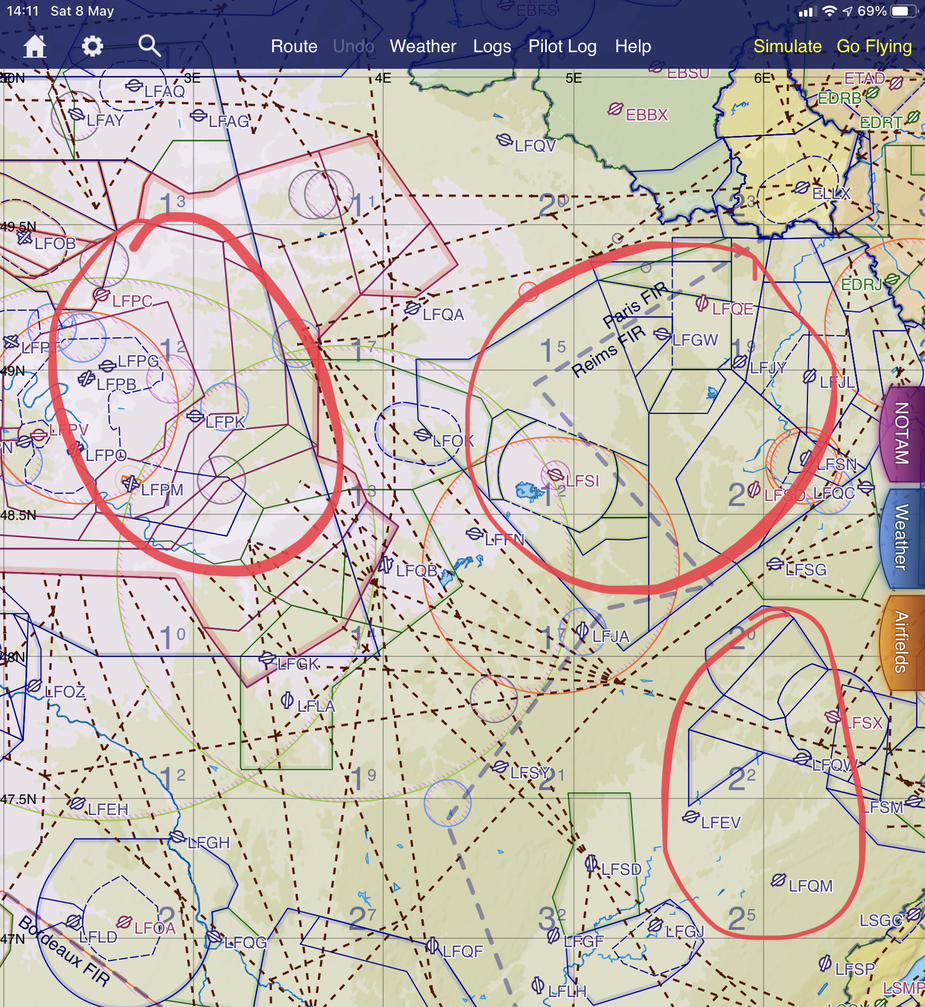No issues VFR near in Restricted Areas south of Nancy, you get to see fighter jets at 6kft

For IFR no idea but there are no low level ATS routes in the blocs Peter highlighted, you can fly local IFR over all these places in CAS/OCAS near Paris, StDezier & Colmar but I doubt ATC would offer one 80nm directs over the place, maybe if one asks nicely in French 

I don’t quite understand why you want to keep swapping back and for between IFR and VFR
At the UK end, to shorten the distance, but this was not relevant to this topic.
At the far end, needed to get below the IFR MEA in the mountains, and again not relevant to this topic.
and why if you are IFR with a FPL you feel it necessary to keep asking for clearances across RAs even if you are on an airway.
To save fuel and time – that’s why one asks for shortcuts.
I am confused by your discussion with Lille on your return
That wasn’t relevant to this topic; it was merely an observation that French ATC was ensuring pilots flying to the UK didn’t bust UK CAS.
Are you IFR or VFR for this part?
In the bits where shortcuts were asked for and refused, IFR. And this is 99% the case; I have been flying this route for almost 20 years.
In contrast, posts here suggest that French pilots get transit through those areas, shown above, routinely. Well, they either do (in which case it would be useful to know how they do it) or they do not (and somehow wires were crossed, or posts made without an understanding of the question, or the goalposts have got totally shifted e.g. the flying is done at 1500ft).
Is it shortcuts you are after? If so what overhead do you find acceptable?
For instance if I wanted to fly EGKA to Megeve LFHM IFR at FL 150 one route on Autorouter would give me a 13% overhead in planning. About 56nm more than the straight line. That 56nm includes the IAP at LFHM and much of those 56nm are taken up on the UK side, ie
EGKA to Rinti to join airway B3. It is a valid Eurocontrol route. There is very little gain to be had by asking for directs (shortcuts on the French part of the route). And because it is a heavy ish traffic area you might be asked to deviate slightly but wherever possible these deviations should even out so that you don’t either increase or decrease the overhead substantially. I would also do the majority of the route speaking English, perhaps turning to French at LFHM.
As was previously stated they do like you to fly a steady route and maintain a recognised FL.
Here is a FF track log, flown IFR @ 9’000. The FPL route was evtl MMD-MTZ-GTQ-STR. Shortly after BILGO, having passed north of the Paris zone, I was asked if I wanted any shortcuts and rec’d DCT MMD. After MMD, halfway to MTZ, rec’d unprompted DCT STR and then before reaching it another unprompted DCT to a WPT near Friedrichshafen, GARMO I believe. Once under Skyguide ATC in southern Germany, I was vectored for the IAP. Much of those directs go right through the eastern no-go zone on the first screenshot by @Peter.
Things may be different now, as that was a couple years ago.
Could it be a weekend?
Peter wrote:
Could it be a weekend?
No, I just checked and it was a Wednesday.
I am afraid I cant comment on IFR flight, Im a VFR pilot. 
I fly from 500ft to 5500ft, sometimes as high as FL75, in general flying lower locally and higher to go somewhere (ie across France) as its usually less bumpy and I can really only remember one time having had to deviate to avoid a restricted area, and I didnt go all the way around it, just avoided a part of it en-route. But VFR and at the altitudes I mentioned, Im not trying to fly over the top of Paris.
I do wonder if IFR isnt part of your problem with the Restricted Areas though, VFR you do get visual with military aeroplanes in Restricted areas sometimes and I believe IFR you expect to have ATC separation, am I right in thinking this?
Regards, SD..
My two cents on the topic:
I am not French but I speak French on the radio and I am based in LFST, so very close to an “impossible” area, and I often find myself flying through this area. When I hear pilots speaking English on the radio I always have the impression that the controller feels a bit uncomfortable, especially if the pilot is a native English speaker. It might not always be the case but it happens a lot. So, language could be a factor here, and it does (in my opinion) influence the decision that the controller will take (e.g. a shorter “active area, you cannot pass” as opposed to a long complicated sentence where they should explain how you might get the clearance).
With that said, if you fly on weekends the majority of the RAs are inactive, and during weekdays it is quick and easy (from my perspective) to be informed about active areas and to get clearances using the FIS or APP you are in contact with as a relay.
Your mileage may vary.
Seba wrote:
especially if the pilot is a native English speaker
That’s a very good point. It does happen that native speakers, oblivious to the years of efforts the locals have had to put through to get to a somewhat acceptable level, insist on exercising their birth right of speaking on the radio as they would when ordering a pint at their pub.
I’m sure it would help if everyone realised the language spoken internationally in aviation, while sharing the vocabulary and grammar of the British Isles, is in fact a language in its own right, spoken without regional accents, at slow speed, and articulating with exaggeration. And no, speaking loudly doesn’t help.
When I hear pilots speaking English on the radio I always have the impression that the controller feels a bit uncomfortable, especially if the pilot is a native English speaker. It might not always be the case but it happens a lot. So, language could be a factor here, and it does (in my opinion) influence the decision that the controller will take (e.g. a shorter “active area, you cannot pass” as opposed to a long complicated sentence where they should explain how you might get the clearance).
That certainly resonates with my experience. It is as clear as it can be, short of getting a proof, that the controller is simply totally BS-ing me when he/she says they will ask the relevant sector. This happens on practically every flight.
On a very recent flight (can’t remember exactly which; would have been one of the two Alps ones) I was IFR, but just curiously looking at my track on my tablet which was running a 2018 French VFR chart (for emergency use mainly), to see if there was any obvious airspace which was causing the problem. I was around FL080-100 and could see that if I was below FL070, there was probably nothing there. I say “probably” because the VFR chart is pretty well unreadable in many places. Assuming I got this right, the controller could have told me that if I descended FL070 or 060, I could have got a direct right through there, but didn’t.
I also recall a flight from somewhere in S Italy or maybe Bastia, back to the UK, and I had about half an hour where I knew that a hugely shorter route was possible FL150+ and I kept asking for a climb (from FL120 or so) and the controller just pretended to not hear the call. It was quite appalling actually; the sort of thing which used to happen regularly in Spain but there the ATC reputation was so bad that one accepted it.
The most likely conclusion I can make is that while some controllers simply cannot speak even the most basic conversational English (isn’t ELP4 that?) and don’t want to get into situations where this would become apparent.
It does happen that native speakers, oblivious to the years of efforts the locals have had to put through to get to a somewhat acceptable level, insist on exercising their birth right of speaking on the radio as they would when ordering a pint at their pub.
I have heard that along the N French coast quite a lot and it is embarrassing indeed, but never heard it when flying IFR on the route mentioned.